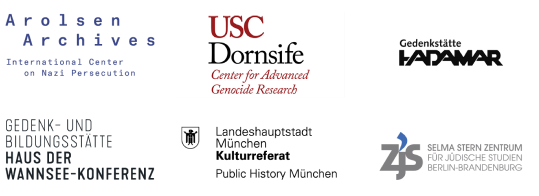Annotations
Neustrelitz
03/08/1943
About 20 people, most of them children, are on the loading area of a truck. In the upper right corner of the picture, a police officer is guarding the people. The vehicle stops in front of the children's home; four children had to board the deportation vehicle.
Annotations
People
4
Keywords
3
Historical context
Deportation von Neustrelitz nach Auschwitz am 14.03.1943
On the morning of March 8, 1943, all the members of the Sinti minority in Alt-Schloen and Sarow in the district of Waren/Mecklenburg were arrested. Most of the people who were still living in the villages at the time were single parents with young children, whose relatives had been categorized as “fit for work” and had been deported in May 1941 already. First, the people were taken on a truck with a trailer to the Catholic children's home St. Elisabeth in Neustrelitz. There, four children - siblings Franz and Alex Rose and Fritz and Paul Wagner - had to board the truck. Afterwards, the entire group of about 35 people was detained in the Alt-Strelitz prison, where people persecuted as Roma and Sinti from all over Mecklenburg were kept prisoner. On March 14, the people were deported to the concentration and extermination camp Auschwitz-Birkenau on a train in which 250 people from Hamburg and the surrounding area were already seated. Two hundred and ten people from Mecklenburg were on this deportation train.
Sources
About the image series
The series consists of three photographs taken when the siblings Franz and Alex Rose and Fritz and Paul Wagner were picked up for deportation from the Catholic children's home St. Elisabeth at Tiergartenstraße 12b (today no. 28). They show about 35 people being held on an open truck and trailer. In one picture, a child can be seen standing between a nun and a police officer. This might be one of the four children mentioned. There is reason to assume one of the two uniformed men pictured to be Gendarmeriemeister (constabulary chief) Möller, who, according to surviving sources, was responsible for arresting and transporting the people.
Photographer
Heinrich Kottmann, chaplain
Heinrich Kottmann (born 1915) served as chaplain in Neustrelitz from 1940 to 1949. During this period, his sister completed an internship at the Catholic children's home St. Elisabeth, from which four children were deported on 08.05.1943. Based on the surviving sources, historian Frank Reuter assumes that Heinrich Kottmann most probably learned about the deportation in advance and decided to secretly photograph the deportation of the children. From 1949 onwards, Heinrich Kottmann first worked in Laage and then in Osnabrück, where he died in 1998. In the Diözesanarchiv (diocesan archives) of the archdiocese of Hamburg and in the Catholic Pfarrarchiv (parish archives) of Neustrelitz, a manuscript of memoirs (1944 - 1949) written by him has survived - with no mention of the deportation.
Provenance
The photos have been pasted into an album titled “Gelegenheitsfotos aus den Jahren 1940-1945 in der Diasporapfarrei Neustrelitz/Meck.” (Snapshots taken in the diaspora parish of Neustrelitz/Meck. from 1940 to 1945). The album was compiled by Heinrich Kottmann, who took the pictures that belong to this series. He labeled the pictures of the deportations with the words “Abtransport der Z.* (s.o.) nach Auschwitz? Theresienstadt?" (Deportation of the G* [see above] to Auschwitz? Theresienstadt?) Heinrich Kottmann handed the album over to the Catholic parish of Neustrelitz in 1990, where it is still kept in the parish archives. The negatives were originally preserved, but have since been lost.
*the term used in the original to refer to Roma and Sinti, which is rejected by many members of the minority as discriminatory, is not reproduced here in full.
Call number at source archive
ohne Signatur
Title at source archive
ohne Titel
Acknowledgements
We would like to thank Frank Reuter, who provided valuable assistance in describing the images and whose research work (see references) formed the basis of this description.
We would also like to thank Josef Wagner, the archivist of the Catholic parish archives in Neustrelitz, who allowed us to view the album in September 2022, as well as Martin Colberg, archivist of the Archdiocese of Hamburg, who supported us in our research.
Text and research by Katharina Menschick.
Kooperationsverbund #LastSeen. Bilder der NS-Deportationen Dr. Alina Bothe Projektleiterin
c/o Selma Stern Zentrum für Jüdische Studien Berlin-Brandenburg
Freie Universität Berlin
Habelschwerdter Allee 34A
14195 Berlin
lastseen@zedat.fu-berlin.de
Ein Kooperationsprojekt von

Gefördert durch

Datenschutz | Impressum